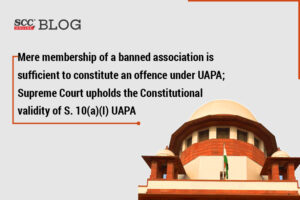Supreme Court: In a matter relating to Unlawful Activities (Prevention) Act, 1967 (‘UAPA’), a Full-Judge Bench comprising of MR Shah, CT Ravikumar and Sanjay Karol, JJ. overruled its 2011 order in Arup Bhuyan v. State of Assam, (2011) 3 SCC 377, and judgments in Indra Das v. State of Assam, (2011) 3 SCC 380 and State of Kerala v. Raneef, (2011) 1 SCC 784, further upheld Section 10(a)(i) of UAPA.
In all the aforesaid cases, the two-Judge Bench comprising of Markandeya Katju and Gyan Sudha Misra, JJ. held that mere membership of a banned association is not sufficient to constitute an offence under the UAPA or the Terrorism and Disruptive Activities (Prevention) Act, 1987 (TADA) (now repealed) unless it is accompanied with some overt violence.
Later, in Arup Bhuyan (supra), on an application by the Union seeking reference on the ground that the interpretation of Central legislations was given without hearing the Union, the Two-Judge Bench of Dipak Misra and AM Sapre, JJ. referred the matter to a larger bench.
The Court said that in the 2011 Judgments the question of the Constitutionality of the provisions of UAPA was not is issue, as they were mere bail applications. Further, the bench observed that when Parliamentary legislation is read down in the absence of the Union, enormous harm would be caused to the State if they are not heard. Further, if the language of a Section is plain and clear and the validity of the Section is not in question, then reading down is not permissible.
The Court also said that the bench in the 2011 Judgments has referred to the United States cases without relying on Indian cases which is not suitable, as the difference in the nature of laws between the two countries must be considered when taking guidance from US Supreme Court decisions.
The Court further said that the Section 10(a)(i) UAPA has been enacted in furtherance of the interest of sovereignty and integrity of India, and these are grounds of the reasonable restrictions under Article 19. Thus, the Court held that Section 10(a)(i) is in harmony with the fundamental rights under Articles 19(1)(a) and 19(2) of the Constitution of India, thus, agrees with the objectives of UAPA.
The complete judgment is awaited.
Source: Press

